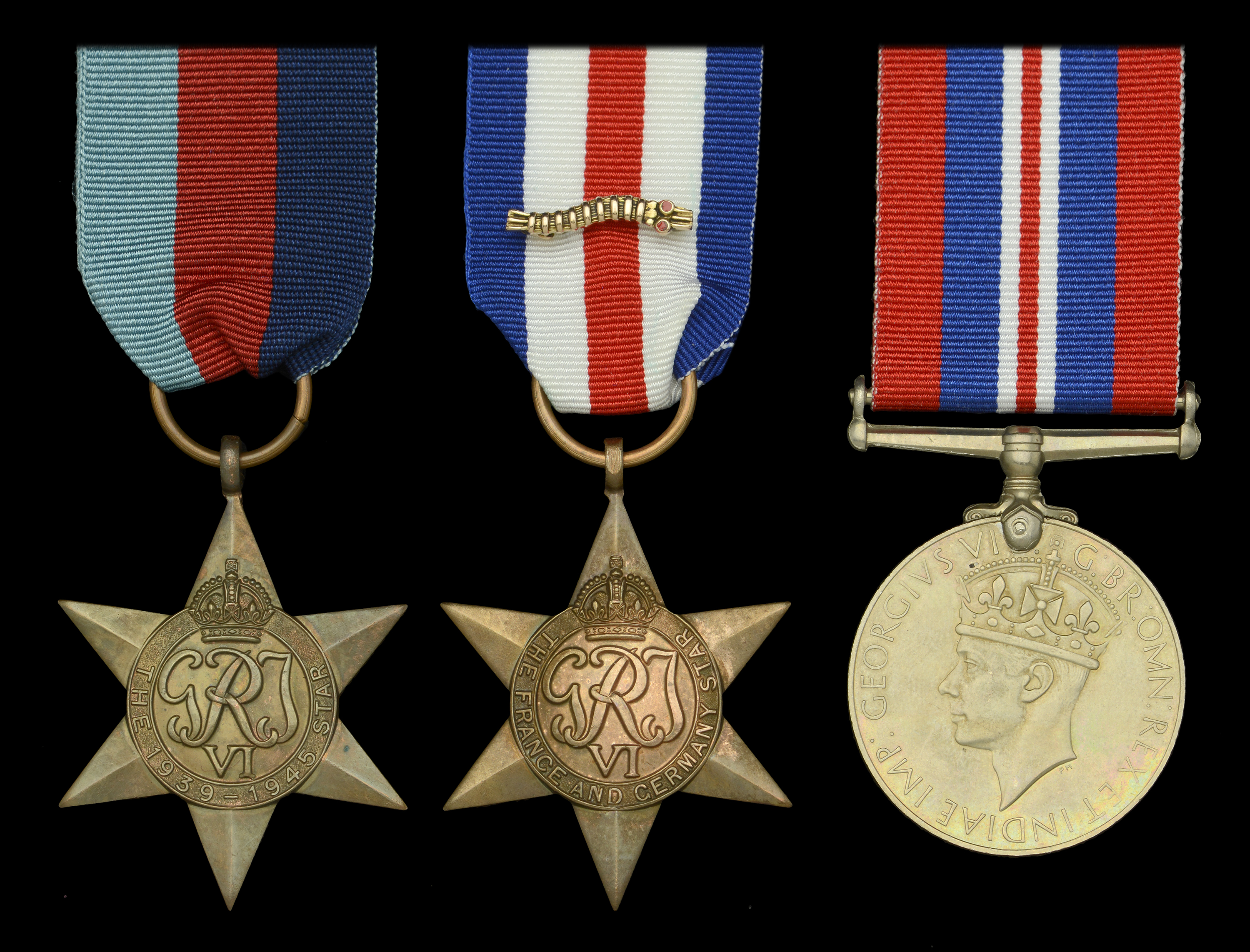Three: Sergeant F. R. Stearn, Royal Air Force, a Wireless Operator with 50 Squadron, Bomber Command, who was shot down and taken Prisoner of War on his first operational daylight sortie to bomb the submarine oil pens at Bordeaux on 13 August 1944, joining the Caterpillar Club in the process 1939-45 Star; France and Germany Star; War Medal 1939-45; together with the recipient’s Caterpillar Club Badge, gold with painted red ‘ruby’ eyes, the reverse engraved ‘Sgt. F. Stearn.’, the medals later issues with Defence Council enclosure in named card box of issue, addressed to ‘Mr F R Stearn, 14 Elmwood Way, Basingstoke, Hants, RG23 8LG’, with ticker tape slips, good very fine (3) £400-£500 --- Frederick Richard Stearn was born on 20 February 1924 and spent his childhood living at 98 Suez Road, Cambridge, before working as a retail assistant in the local shoe shop. He volunteered for the Royal Air Force in February 1942, describing himself as ‘an enthusiastic 17 year old who had a passion for planes’, and was soon sent for training as a Wireless Operator and Air Gunner in Bomber Command. An affectionate letter home to his mother notes: ‘I have been pretty busy this last three days having moved to a different camp and also flying the pants off us... Yes, we certainly get some flying hours in here!’ Posted on 7 August 1944 to 50 Squadron, Royal Air Force, Stearn enjoyed just two practice flights from R.A.F. Skellingthorpe as Wireless Operator aboard a Lancaster captained by Flight Sergeant P. Lorimer before this new crew was assigned their first operational mission just six days later. The recipient’s memories of his first bombing run to Bordeaux in Nazi-occupied France were later detailed in the Basingstoke press and mentioned in Bomber Crew by James Taylor and Martin Davidson: ‘It was a beautiful sunny day, and it felt like a training exercise. We didn’t see any fighters but there was quite a bit of flak in the air. Before we could release our bombs, all the flak gunners aimed at our plane and we got shot up pretty badly. Two of our engines were on fire and the controls were shot away...’ What happened next was somewhat of a blur for Stearn, but somehow he, along with the rest of the crew, parachuted out of the burning plane relatively unscathed: ‘All I remember is flying down and German soldiers firing on us. I don’t remember hitting the ground, but I was sitting under a tree thinking “wow, four hours ago I was in England!”’ Having landed on the north bank of the River Gironde, Stearn and his 6 crew soon found attempts at evasion to be a fruitless task; landing amidst an enemy battery, the attention of machine guns and a large number of enraged Germans soon resulted in a frisking at the local Luftwaffe command post and a trip to the Municipal prison at Cognac. Transferred to the military prison at Bordeaux and thence to Merignac, Stearn and 21 comrades were driven to Chateauneuf early on the morning of 22 August as part of a large convoy detailed to return to Germany. A contemporary account given to M.I.9. by a fellow crewman, Sergeant Grey, describes this period: ‘We spent two days and nights in a lorry sitting on boxes of hand grenades and sticks of T.N.T. It was raining most of the time and we had no means of shelter. We made several attempts to escape, but unsuccessfully as the convoy was heavily guarded. The following morning we were told we would remain here (Chateauneuf) for some time, as the Allied troops were on the move. We were put into a filthy barn and were given some straw to lie on. By this time most of the men were ill from the lack of proper nourishment, several of them suffered badly from dysentery. About 1800 hrs the farm was attacked by the Maquis, the attack lasted about 20 minutes. On the morning of 28 August we were told to prepare to go to hospital in Angouleme. We arrived at the hospital at 1100 hrs and were put on a ward with several Allied prisoners. On 1 September at 1330 hrs the Maquis liberated the town. From this point our journey was arranged for us.’ Liberated by American forces, Stearn was able to make his way back to England where he later took employment as Assistant Manager in the Co-Op’s footwear department in Cambridge. Relocating to Basingstoke in 1960, he later looked back on the events of 13 August 1944: ‘I’m not particularly proud of what happened... We got shot down on our first operation and I have never lived that down. It made men of us - we had never had responsibility before. I wouldn’t have missed the comradeship for the world and I’m proud of what we achieved!’ Sold with the recipient’s original R.A.F. Navigator’s, Air Bomber’s and Air Gunner’s Flying Log Books (2), detailing the recipient’s full service; original named Caterpillar Club Certificate of Membership card and two letters from Leslie L. Irvin welcoming Stearn and enclosing the gold Caterpillar, the latter dated 12 February 1945; three original telegrams to the recipient’s father informing him that his son is missing in action and later confirming safe arrival back in England; a letter from Wing Commander Frogley of 50 Squadron informing the recipient’s father that he has been shot down over enemy territory, and another from the Station Chaplain and Air Ministry; two card dog tags named to the recipient; together with a large and comprehensive file of research compiled by the current vendor, including a photograph of the recipient in later life proudly holding up his medals.
Auctioneer's Buyers Premium: 24% (+VAT)
There is an additional charge of 4.95% (+VAT/sales tax)
See Full Terms And Conditions


